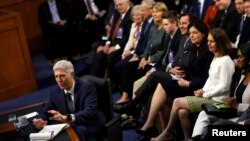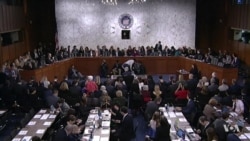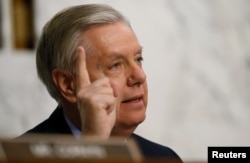Even before confirmation hearings for Supreme Court nominee Neil Gorsuch concluded Thursday, Senate Democrats voiced intensified opposition to President Donald Trump's pick while Republicans rallied behind him.
"I have concluded that I cannot support Judge Neil Gorsuch's nomination to the Supreme Court," said Senate Minority Leader Chuck Schumer, a New York Democrat. "Judge Gorsuch was unable to sufficiently convince me that he'd be an independent check on a president who has shown almost no restraint from executive overreach."
"He has sterling credentials and a reputation as a fair and impartial jurist," said Senate Majority Leader Mitch McConnell, a Kentucky Republican. "He's a proven jurist, he's an outstanding intellect. He's earned the respect and admiration of so many — Democrats, independents and Republicans alike."
Partisan Divide on Gorsuch Deepens After Confirmation Hearing
After four days of lengthy hearings, the Senate Judiciary Committee was expected to advance Gorsuch, a federal appellate judge, to the full chamber for a final confirmation vote, which could come next month.
During nearly 20 hours of questioning, Gorsuch did not allay Democrats' concerns about his conservative philosophy or his judicial independence from the president.
"If you have a statute against torture and warrantless surveillance, is there any circumstance in which a president could ignore that statute?" Vermont Democrat Patrick Leahy asked the nominee.
'I am independent'
"Senator, I don't want to deal with a case that might come before me," Gorsuch responded. It was an answer he repeated dozens of times, to the frustration of Democrats.
"What worries me is you have been very much able to avoid any specificity [in your responses to questions] like no one I have ever seen before," the committee's top Democrat, Dianne Feinstein of California, told Gorsuch. "For us on this side [Democrats], knowing where you stand on major questions of the day is really important."
Gorsuch repeatedly insisted he is an independent jurist beholden to no one.
"I am a judge. I am independent. I make up my own mind," the nominee said.
Judicial nominees historically have declined to tip their hand on how they might rule in future cases. Republicans noted that two of former President Barack Obama's Supreme Court nominees, Elena Kagan and Sonia Sotomayor, did the same.
"If we're going to vote against a nominee because they won't tell us things that we want to hear about issues important to us, then the whole nominating process has become a joke," said Republican Senator Lindsey Graham of South Carolina.
Republicans portrayed Democratic opposition to Gorsuch as part of a larger campaign to obstruct Trump's agenda.
"Even more than four months after the election, some on the far left simply refuse to accept the outcome of last year's election," McConnell said. "Well, it's past time to move on from that mindset and return to the serious business of governing. One way we can do so is by confirming Judge Gorsuch."
Outside groups weighed in on the final day of the confirmation hearing.
"We believe that he meets and exceeds the highest standards in integrity, professional competence and judicial temperament," said Nancy Degan of the American Bar Association, a private, nonpartisan attorneys group, which gave Gorsuch its highest rating of "well-qualified."
Fear of 'power grabs'
Others warned of perils ahead.
"Now would be an especially perilous time to promote to the Supreme Court a judge who wouldn't stand up against presidential power grabs," said Elisa Massimino of Human Rights First, a Washington advocacy group.
Massimino noted that before joining the federal bench, Gorsuch worked for the Justice Department under former President George W. Bush and defended the use of enhanced interrogation techniques on terror suspects.
"Policies he [Gorsuch] promoted and defended violated American ideals and inflicted unnecessary suffering," she said. "Did he disagree with positions of the administration on torture? And if he did, why didn't he follow the example of others and speak out?"
During the hearing, Gorsuch said he defended such practices not out of personal conviction, but as an attorney serving his client — the U.S. government — at the time.
As the minority party, Democrats have little power to block Gorsuch on the Senate floor. Should they mount a filibuster, requiring a three-fifths majority to confirm him, Republicans could change Senate rules and put him on the Supreme Court with a simple majority vote.
If confirmed, Gorsuch would replace conservative Justice Antonin Scalia, who died early last year.















